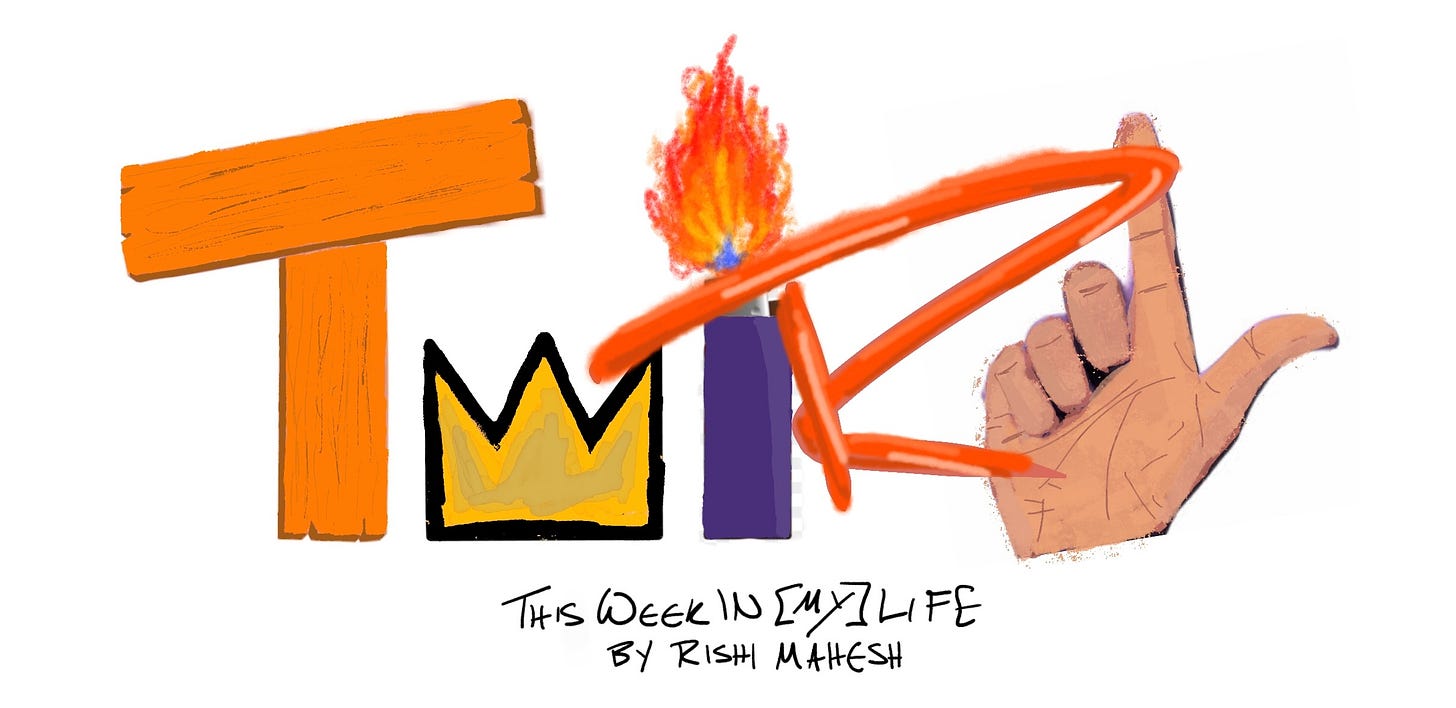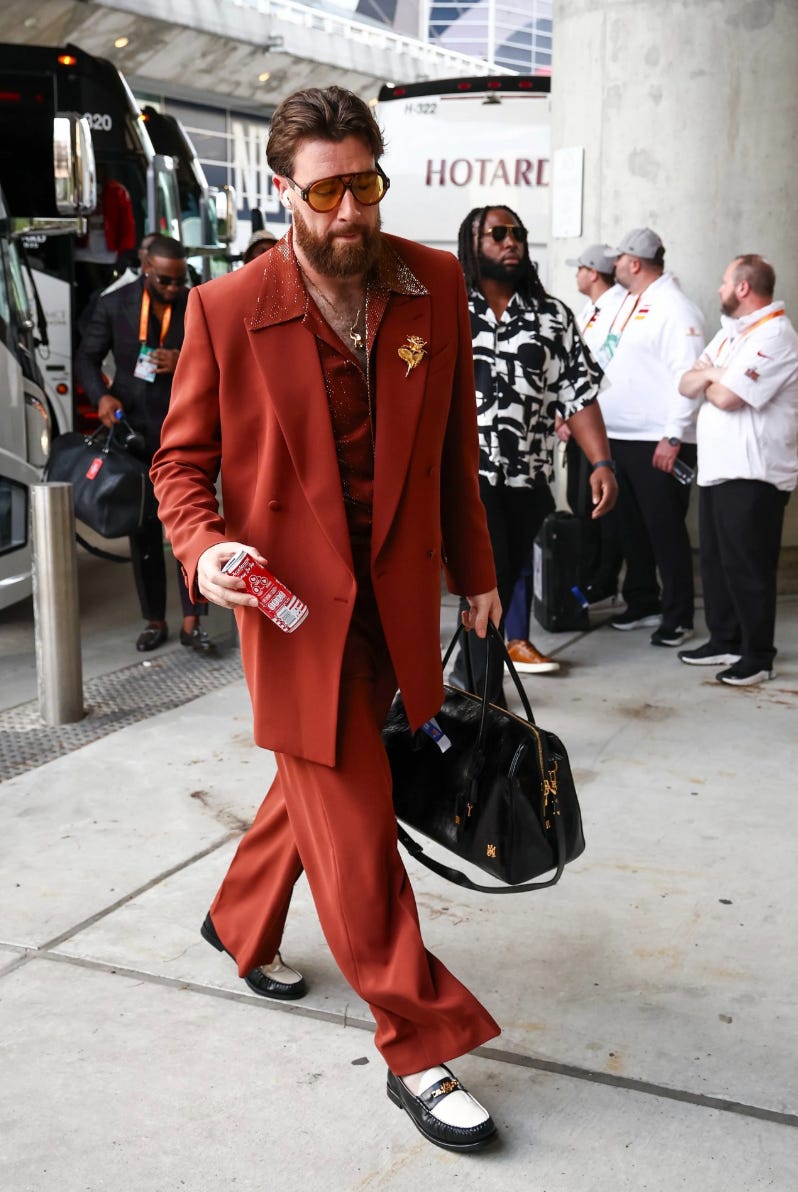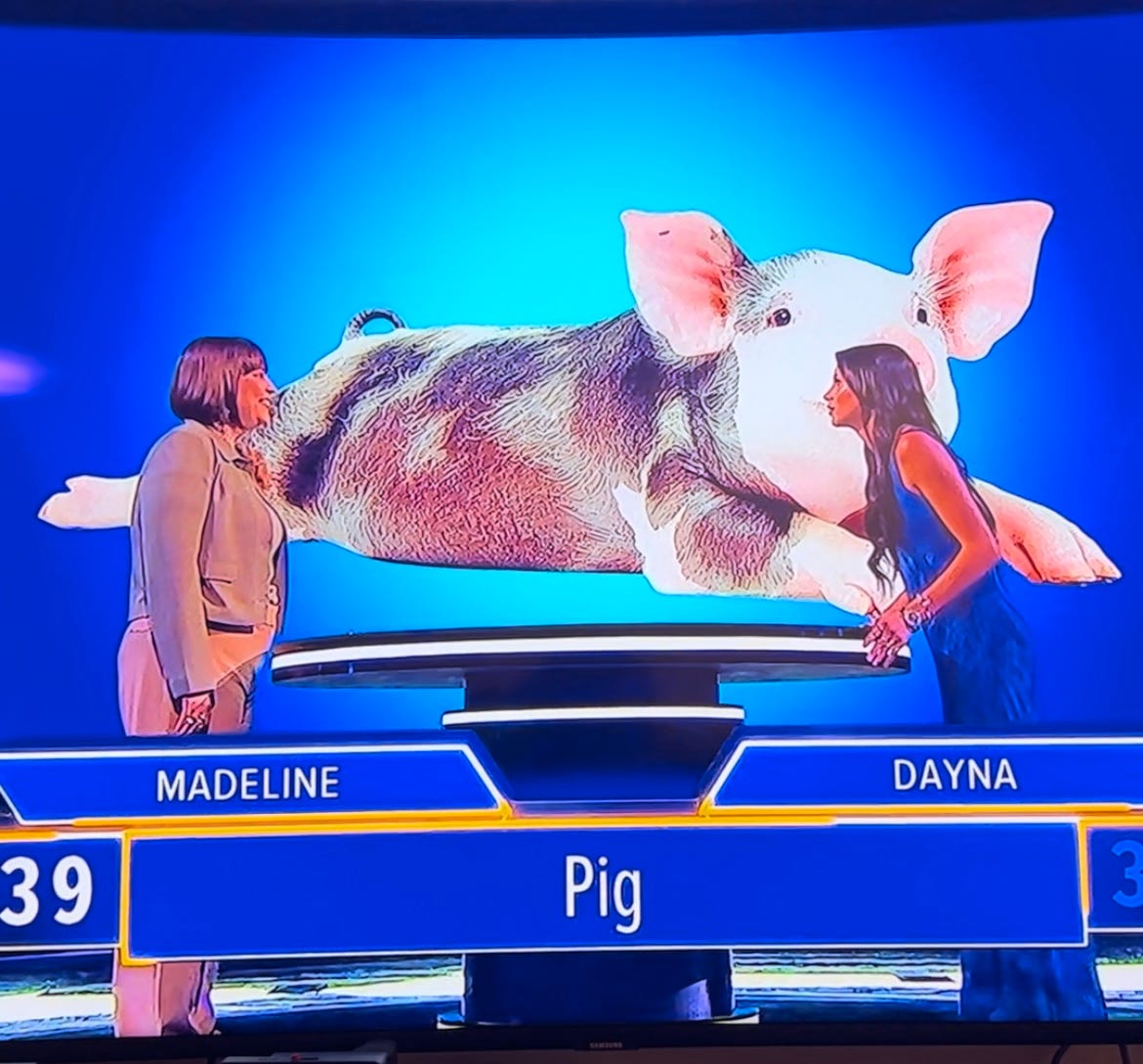How much does a culture cost
im wondering: the right wing might be artistically impotent, but does it even matter?
it’s just true- even if the majority of America really was as racist as right wing politicians might wish they were, cultural products of right-wing whitewashed Americana shit just aren’t as good as they wish it was. You saw the other nominees for best country album at the Grammys:
Even the most racist people I know are not listening to that shit*
*author does not claim these artists are racist and in fact has never listened to most of these albums
A few weeks ago, I was spiraling about Trump rolling back DEI on the national scale. Not because I thought DEI programs were noble corporate efforts to deliver us to the promised land of racial equity, or because I’d be pissed off if every commercial for almond milk didn’t look like the racial equivalent to a bag of chex mix-
But mainly because my workplace, a creative marketing team at a medical nonprofit, heavily insinuated that diversity was not going to remain a priority in our consumer-facing work. Since then, I’ve been disturbed about American institutions explicitly advertising white supremacy, heteronormativity, and patriarchy.
Which to me, doesn’t make any sense even on the most capitalist, market-driven terms. Having day jobs in marketing since I was a junior in college taught me that as minority groups grow in population size in the United States, so does their purchasing power, and the best way to access that purchasing power is to segment that population and target them, partially through advertising. This is why I shared skepticism about the corporate liberal focus on diversity and inclusion, but from the left, not the right. People love to label and categorize themselves as consumers, and fragmenting cultural groups is a great way to create a consumer base.
That said, diversity being market-smart makes the anti-DEI backlash even more anxiety-inducing. I’ve felt uneasy for much of Trump’s first month in office, wondering if ripping away the even already very thin veil of liberal values that shrouded our high seats of government would trickle down into purging minorities from every tier of culture. That’s why I was honestly shocked, tuning into the last few weeks of the year’s biggest broadcast events, to see a Grammy’s ceremony that was incredibly diverse: celebrating, programming, and awarding Black, queer, and female artists, and many intersections between, as if ignorant to the fact that Nazi’s are running our political institutions. As someone who tends to think of all elite society as an oppressive monolith, this made me wonder where (at which tax bracket, specifically) the buck stops.
You also don’t have to be a hyperbolic, reactionary, symbolically driven person (like me) to feel that the Super Bowl was a microcosm of cultural battle as well. Right before the event, the debatably most prominent player on the Chiefs praised Trump, wore this horrible outfit, and sported a haircut clearly influenced by a hubristic hairstylist fighting tooth and nail to drag this CTE-addled strongman to the A-list.
Jalen Hurts led the eagles to the Super Bowl. He’s one of eight black quarterbacks to ever play in the Superbowl, and one of four to win it.
Readers of this newsletter know that the life and work of Kendrick Lamar (with whom I share a birthday) is a fixation of mine, but even so, his halftime performance blew my mind. A fellow theatre nerd texted me “Ngl, kendrick superbowl was brechtian af” and I have to agree! It was political, theatrical, and symbolic, reinforcing Black America’s presence in our nation and credit as the driving force of American culture, despite how the political institution may seek to drive it out.
Basically, after a month of feeling really bizarre emotions brought about by our political reality, the Grammy’s and the Super Bowl were energizing and validating, filling me with a sense of relief and inspiration that minority voices, artists with the experience of overcoming marginalization, still do drive American culture.
During the Super Bowl, FOX Nation- which self describes as “Shows, movies, and documentaries that celebrate America,” aired ads for a new National Parks docuseries by Kevin Costner streaming on the platform. FOX Nation boasts the 2 million paid subscribers that they landed thanks in part to finalizing their deal with Costner. If they keep this up, they might someday manage to reach 1% of Netflix’s subscribership (over 300 million paid subscribers), or 2% of Warner Bros. Discovery (110 million subscribers).
FOX also advertised NASCAR’S upcoming Daytona 500- which in 2024 was the second-lowest rated and least watched Daytona in history, with under 6 million viewers on FOX: a 27% decrease from the previous year. NASCAR has been in ratings decline since 2006. More than 90% of NASCAR drivers and viewers are white.
In terms of first week sales for each album nominated for country album of the year,
Beyonce’s “Cowboy Carter” sold 407,000 units in the first week.
Post Malone’s “F-1 Trillion” had 250,000.
Kacey Muskgraves “Deeper Well” sold 66,000.
Chris Stapleton’s “Higher” sold 57,000 copies.
Lainey Wilson’s “Whirlwind” sold 48,000.
This is not to say that the value of art can be properly judged quantitatively, or to denigrate any of these artists, but merely to show that even on purely economic terms, you can’t win over culture without diverse appeal. No NASCAR news is ever going to make people react the way that they did when Luka Doncic got traded to the Lakers.
The right yearns for a return of American modernism. They want to tell stories wherein white, leading men are the moral compass of the society they build around them. These men embrace family and nationalistic values, and are praised for doing so. But the thing is, they made the best of that shit more than 50 years ago.
Citing this scene from John Ford’s “The Searchers” (1956). Hailed as one of the greatest westerns, and most influential American films period, it stars John Wayne as “Ethan Edwards,” a veteran who fought (for the CONFEDERACY!!) in the Civil War, and embarks on a quest to recover his abducted niece. This scene is shot beautifully, with reverence for the natural American landscape. The men ride into frame poised, gracefully, with dignity. Those at the ranch watch them, enraptured, bursting with gratitude at their return. Edwards carries his niece off the horse, as the lyrics to the song begin: “A man will search his heart and soul / Go searching way out there / His peace of mind he knows he’ll find / But where, oh lord, oh where? / Ride away, ride away, ride away.” Honestly, it slaps. White American patriarchy peaks literally right here. We see it, as the camera follows the reunited family back into their home, where they are obscured in the dark home. Edwards, lit up amongst the backdrop of the American West, turns around and walks off into his endless, solitary, masculine, incredibly American search for independence and value.
But I want to contrast that moment with Wim Wenders’ “Paris, Texas” (1984). You can watch this trailer and see how it evokes the tradition of Film Americana: amazing American landscapes, following the tale of this wandering, American man. In this film, you follow a man who returns to his family after having left them four years prior. He finds the son he left behind, whose mother has since abandoned him too. Together, they begin a romantic, masculine quest to find their wife / mother.
The journey culminates in this scene, where the history of their deteriorated relationship and the circumstances that led him to leave his family are revealed. Too many people have written about this movie for me to be worried about spoiling the ending, and yet I feel the need to be restrained. It’s just that good of a movie. Nevertheless, at this moment, the movie juxtaposes his romantic yearning, which we’ve been submerged in for the entire course of the movie thus far, with the horrifying actions he took against his partner and family. It reveals who is under the costume of the American Man, and asks how he affects the American woman and the American child.
Many voices on the right ask that our culture go back to celebrating great American men. But to do so, we’d have to turn things back pretty damn far. So many red carpet interviews cite “Paris, Texas” as a Top-4 viewing. Its continued ability to resonate with new audiences calls into question if there’s any desire present in the culture to go back to where we came from at all.
I may cast doubts on right wing media’s ability to capture the hearts and minds of the American people, question it as economic strategy, and say that Travis Kelce has a horrible haircut. But the bigger question is, ultimately, does any of that matter when the consequences of the control they have over our material conditions are so, extremely dire?
Watching the ads at the Super Bowl, one thing was made very clear: regardless of how bad right wing media can be, technofascism has taken hold of our society and has already well-eroded our human inclinations and capabilities.
Donald Trump’s presidency and Elon Musk’s status as our unelected VP reveals that business and governance have become one and the same in America. Unfortunately, those in charge are explicitly encouraging global leaders to take us from global neoliberalism into a new age of global fascism. Musk is traveling the world, saying that European countries (and Japan) need to hold onto the cultural borders and demographics that define their nation, nations that have existed in their current form for about 0.04% of human history (80 years since WW2 / 200,000 years of human existence).
Ads that played at the Super Bowl included those for AI that does your thinking for you and services with insane labor tradeoffs: like this UberEats commercial. UberEats is a network based platform that you use from one of two ends: either as a laborer, using the app to scrape together a livable wage or earn the extra income it takes to make ends meet, or you use as a consumer who is able to pay the average 20-30% increase in price that results from ordering food via a delivery app.
Celebrities’ faces are featured in advertisements to light up the part of your brain that recognizes faces, because without them, you’d need to use the part of your brain that allows you to follow a storyline or understand a joke with cultural context. All of that requires intelligence, and those running our society are on a mission to make us all as dumb as humanly possible. After the Super Bowl, the season 3 premiere of “The Floor” aired with 14 million viewers (including me and my friends who watched it after the game.) A lot of this game is spent identifying objects- associating names with images and objects as you may expect a small child to do.
There were some categories that were definitely harder than these ones, but many that were not! One of our friends reminded us of the show “Are you smarter than a fifth grader,” which was genuinely intellectually rigorous, stimulating, and played as prime time television for children and adults! What the hell!!!!
For a while, I’d been anxious about dystopia marching down our door. Now I feel some relief, knowing that it is undoubtedly here. With that in mind, I wonder: to what extent are “cultural victories” valuable in the absence of material, political, or economic gains? Which artistic creations speak truth to power, and which pacify us with symbolic balms?
Trump term one gave rise to a certain kind of cultural product amongst “resistance” liberals. In 2016, my university did a production of Little Shop of Horrors, in which the plant was dressed up as Trump. I didn’t see it. I also just re-listened to Hamilton again, an Obama era production that doubled down on its own relevancy under Trump, as a piece emphasizing immigrants’ role in building American government, values, and society. Those which… led to Trump.
Granted, these are both examples of commercial musical theatre, but they were both indicative of the confusion a lot of artists have when it comes to the function of art to affect culture, and what role we have to admonish our national character, or emphasize its potential. From 2016-2024, mainstream artists seemed to say that American governance was something noble that had been corrupted. But after Trump’s shadow has dominated the last decade, and left him with a second non-consecutive term in office, I wonder what tone the cultural response will take.
At the end of last year, I read two books that dealt with fictional, radical political realities. One of them was Birnam Wood by Eleanor Catton and the other was Chain Gang All-Stars, by Nana Kwame Adjei-Brenyah.
Birnam Wood focuses on the interpersonal dynamics that impact a leftist gardening collective based in New Zealand when a mysterious billionaire offers to fund their organization. These characters wrestle back and forth with the integrity of their radical actions, personal ambitions, and intimate relationships with the people involved in and opposed to their work. The events of the story ask the characters to weigh the purpose of the small revolutions and compromises made amongst their predominantly white, affluent comrades.
Chain Gang All-Stars reflects a society wherein members of the prison population are given the opportunity to fight for their freedom or demise in televised cage matches that have become the most consumed broadcast entertainment in the world. This science-fiction novel is filled with footnotes that juxtapose its satire with real information about the American prison system, specifically highlighting the struggle of those most disproportionately affected: Black and brown minorities in the US. These characters are trapped within a violent carceral system and society taken to the furthest extent of the author’s imagination (and maybe even prediction).
In both books, characters debate how to struggle against their political and economic realities. The comrades of Birnam Wood wonder if with more money, resources, privileges, and time, might we become more effective revolutionaries, or more pacified? How easily can our values become frail and our alliances petty, and thus open to the manipulations and concessions of powerful people? In Chain Gang All-Stars, its captive performers ask how, even with all hope and humanity ripped from us, every act of love and every motion of rebellion can spark hope.
Does an act of brechtian hip-hop performance at the Super Bowl have the power to affect material conditions? I literally do not fucking know lmao. But James Baldwin said (about something totally different) “Art would not be important if life were not important, and life is important. Most of us, no matter what we say, are walking in the dark, whistling in the dark. Nobody knows what is going to happen to them from one moment to the next, or how one will bear it. This is irreducible. And it’s true for everybody. Now, it is true that the nature of society is to create, among its citizens, an illusion of safety; but it is also absolutely true that safety is always necessarily an illusion. Artists are here to disturb the peace. They have to disturb the peace. Otherwise, chaos.”











